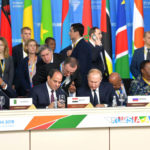Once upon a time there were three bulls grazing together in a sunlit meadow.
One was red, strong and brave;
another was yellow, cheerful and loud;
and a third was green, calm and prudent.
United, they formed an impenetrable wall – until a wolf arrived. First he convinced two of them that the red bull was a nuisance; then that the yellow one made too much noise. When only the green one remained, the wolf no longer needed to speak; he simply opened his mouth.
“You’re not eating me today,” whispered the green bull before dying. “You ate me the day I let you attack the red one.”
Europe, that old meadow where reason, culture and prosperity once flourished, now resembles that green bull all too closely. It looks strong, but it is alone – alone because it allowed itself to be devoured in pieces, believing that the danger was someone else’s. Recent history echoes that fable. Brexit was the first bite: the red bull expelled from the meadow. The United Kingdom left with wounded pride, and Europe sighed with relief, convinced that its departure would ease tensions. But with its exit, the Union lost a military, diplomatic and Atlantic voice that had balanced its scales.
Next came Ukraine, the yellow bull: bright, perhaps noisy, but vital for continental security. Europe was indignant, approved sanctions and sent weapons, but allowed the conflict to fester at its own threshold, hostage to the interests of Washington and Moscow. Today, Gaza becomes yet another mirror of impotence. The first phase of Donald Trump’s plan — a ceasefire, exchanges of hostages and promises of humanitarian aid — has been greeted with relief, almost guilty relief, because it offers once more an excuse to do nothing.
The old continent watches the fires of the world from its comfortable window, convinced that distance protects it. Europe retains its economic strength: it has the best roads, the best education, the most advanced hospitals. But that strength has become its sedative. “Europe is the envy of the world,” remarked diplomat Jorge Dezcallar de Mazarredo recently. “We have the best, but that is very expensive. How long can we maintain it?”
The echo finds its most bitter metaphor this week, when thieves stole some of the Louvre’s most prized historical jewels — a crime that goes beyond theft: it’s a mirror. Europe is no longer just a continent‑museum, proud of its past and comfortable in its decline; it is a museum whose relics are being stolen while its guardians argue over visiting hours.
Europe, weary of wars and of leading, has ceded its role to others: to the United States, which decides; to China, which produces; and to Russia, which provokes. Each crisis — whether in Gaza, in Kyiv or in London — has revealed the same pattern: a Europe that reacts but does not act; that comments but does not lead.
The most realistic reports suggest that by 2050 no European economy will be among the world’s ten largest. It isn’t a prophecy; it’s a consequence. Decline doesn’t happen overnight: it is nurtured in comfort and in the illusion that there will always be time. To avoid its fate, Europe must remember what it once forgot: that unity is not a speech but a shield. Because the day it allowed the red bull — its strategic independence, its cohesion, its common voice — to be devoured, it began to lose its own flesh.
“You’re not eating me today,” the green bull said… “You ate me the day I let you eat my brother.”




